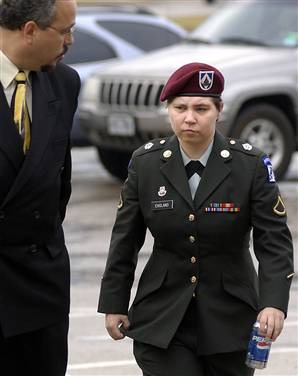 Lynndie England is (thankfully) no longer a hot topic, but I was reminded of her story by this week's episode of the consistently excellent This American Life. For those of you that haven't switched on a TV or read a blog (or one of those newspaper thingies) in the past year, England was one of the US soldiers that was photographed humiliating naked Iraqi prisoners in Abu Ghraib. One particular picture, showing her holding a leash tied around the neck of a naked prisoner lying on the ground, made her the poster girl for Abu Ghraib, and, to some extent, for the failures of the American approach to the Iraq War.
Lynndie England is (thankfully) no longer a hot topic, but I was reminded of her story by this week's episode of the consistently excellent This American Life. For those of you that haven't switched on a TV or read a blog (or one of those newspaper thingies) in the past year, England was one of the US soldiers that was photographed humiliating naked Iraqi prisoners in Abu Ghraib. One particular picture, showing her holding a leash tied around the neck of a naked prisoner lying on the ground, made her the poster girl for Abu Ghraib, and, to some extent, for the failures of the American approach to the Iraq War.
When the images of Abu Ghraib made it into the press, England rapidly became the principal scapegoat for the crimes committed by the US in the prison. She was perfect for the part: pretty much everyone, from both ends of the political spectrum, could agree on hating Lynndie England. The coverage unanimously condemned her, without paying much heed to her side of the story. Eventually, the journalist Philip Gourevitch and film-maker Errol Morris decided to interview her extensively for two separate (and equally excellent) projects investigating the events surrounding Abu Ghraib and, more importantly, their representation in the media.
This is what England had to say about the infamous photograph of Abu Ghraib: "I don't see the infamous picture from the Iraqi war. (...) Yeah I was in a picture showing me holding a leash around a guy's neck. But that's all I did, I was in a picture, I never actually did anything to them. I was convicted of being in a picture." (my emphasis)
I didn't write this post to pass judgment about England's guilt regarding what she did in Abu Ghraib. But I think that her statement is pretty much right. This image was set up for the camera: it is because there was a camera there that this event took place. It is extraordinary just how much power a single photograph can still have, even within the context of something like the Iraq War which was filmed, recorded, written about and photographed in real-time, more extensively than any other war in history. And yet despite this, perhaps the most famous image of that war is staged.
Last week, two French art students were awarded Paris-Match's annual Grand Prix du Photoreportage Etudiant for their photographic story documenting the precarious lives of students today and their struggle to survive. When they received the award (which has now been taken taken away from them) they revealed that the winning series had been staged in order "to reveal the codes used too often in photojournalism and to prove that something real can be translated into something staged." Interestingly, they also stated that they did this because they were art students and, had they been studying journalism, would never have allowed themselves to commit such an act. There has been some discussion of this in the blogosphere, and opinions are divided. However, in the light of stories like that of Lynndie England, the statement of these French students seems all the more relevant.
Further reading, listening and watching: Philip Gourevitch, The Ballad of Abu Ghraib Philip Gourevitch's segment on This American Life, episode 384 (fast forward to 18:27) Errol Morris, Standard Operating Procedure